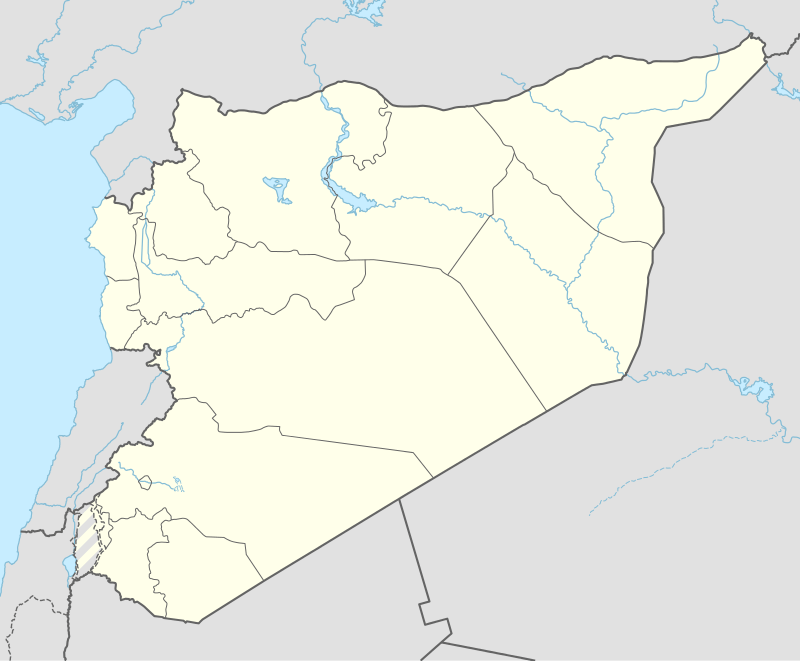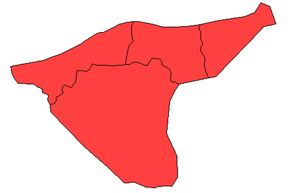Al-Malikiyah
| Al-Malikiyah المالكية Dêrika Hemko | |
|---|---|
| City | |
|
North east | |
| Nickname(s): ديريك | |
 Al-Malikiyah Location in Syria | |
| Coordinates: 37°10′N 42°08′E / 37.167°N 42.133°E | |
| Country |
|
| Governorate | Al-Hasakah Governorate |
| District | Al-Malikiyah District |
| Nahiyah | Al-Malikiyah |
| Elevation | 500 m (1,640 ft) |
| Population (2012) | |
| • Total | 39,000 |
| Time zone | EET (UTC+2) |
| • Summer (DST) | +3 (UTC) |
| Area code(s) | 052 |
Al-Malikiyah (Arabic: المالكية Al Mālikiyah, Syriac: ܕܪܝܟ, Dayrik, Kurdish: Dêrika Hemko) is a small Syrian city and the center of an administrative district belonging to Al-Hasakah Governorate. The district constitutes the northeastern corner of the country. The town is about 20 km (12 mi) west of the Tigris river which defines the triple border between Syria, Turkey and Iraq. According to the Syria Central Bureau of Statistics (CBS), Al-Malikiyah had a population of 26,311 in the 2004 census. It is the administrative center of a nahiyah ("subdistrict") consisting of 108 localities with a combined population of 112,000 in 2004.[1] The population enjoys demographic and ethnic diversity that is characteristic of most of Al-Hasakah Governorate. The town is inhabited by Kurds, Assyrians, Arabs and Armenians. As a preliminary result of the ongoing Syrian Civil War, Al-Malikiyah today is situated in Jazira Canton within the autonomous Federation of Northern Syria – Rojava framework.
Etymology
The name of the town, "Al-Malikiyah", is named after a Syrian army officer Adnan al-Malki. The original native name is a matter of controversy. The Kurdish name Dêrika stands for tumbleweed, which is ubiquitous in the region. The alternative name, "Dayrik", is presented as a Kurdish deformation of the Syriac-Aramaic word for monastery, "Dayr".
History
The town's indigenous people are Assyrians who trace their ancestry to many Turkish villages in (Tur Abdin) whose inhabitants fled to Syria and established the city after the Assyrian Genocide. Assyrians began to emigrate from the area after the Amuda massacre of August 9, 1937, which emptied the Amuda of its Assyrian population. In 1941, the Assyrians of Malikiya were subjected to a vicious assault. Even though it failed, fear, anxiety and the immigration of Kurds from Turkey led to Malikiya, Darbasiya and Amuda becoming predominately Kurdish.[2]
As of 2004, Al-Malikiyah is the fifth largest city in Al-Hasakah governorate.
Demographics
In 2004 the population of Al-Malikiyah was 26,311. The population consists mostly of ethnic Kurds and Assyrians in addition to a significant large number of Arabs and a smaller number of Armenians. The northern half of the town is mainly inhabited by Muslim Kurds, and the southern part by the Assyrians. As the economic center of the district, the town is usually flocked by people from the surrounding villages and towns, especially during the morning hours. Al-Malikiyah has seen a dramatic urban expansion and real estate development in recent years which led to many streets being extended to new neighborhoods that are now part of the continually growing town.
As of November 2014, only 200 ethnic Armenians remain in the city out of a pre-civil war figure of 450.[3]
Gallery
-
New Syriac Orthodox Church on Main street
-
New Church dome
-
Chaldean Catholic Church
-
Chaldean Catholic Church and School Building
-
Looking east
References
| Wikimedia Commons has media related to Al-Malikiyah. |
- ↑ General Census of Population and Housing 2004. Syria Central Bureau of Statistics (CBS). Al-Hasakah Governorate. (Arabic)
- ↑ Abu Fakhr, Saqr, 2013. As-Safir daily Newspaper, Beirut. in Arabic Christian Decline in the Middle East: A Historical View
- ↑ http://www.dw.de/demoralized-syrian-refugees-return-home/a-18069604
Coordinates: 37°10′N 42°08′E / 37.167°N 42.133°E



